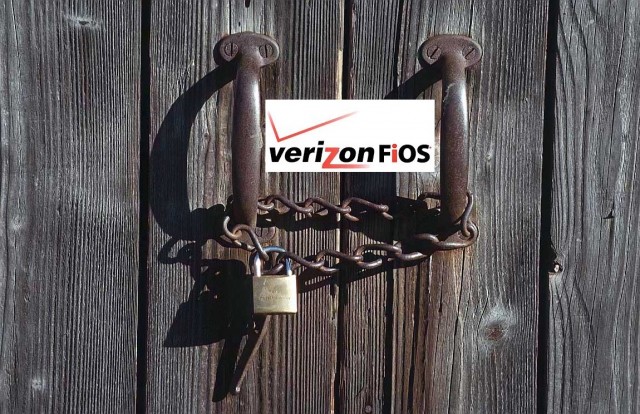 Two years after Verizon promised its FiOS fiber to the home service would be available to every resident of New York City, the city sued Verizon Communications on Monday, alleging Verizon failed to meet its commitment.
Two years after Verizon promised its FiOS fiber to the home service would be available to every resident of New York City, the city sued Verizon Communications on Monday, alleging Verizon failed to meet its commitment.
The 19-page lawsuit, filed in New York’s Supreme Court, contrasts the city’s interpretation of Verizon’s commitments laid out in a 2008 franchise agreement against Verizon’s claim it has met its obligations. Central to the case is the city’s claim tens of thousands of New Yorkers cannot get FiOS service from Verizon, even though Verizon’s fiber network may be running down the street.
“Verizon must face the consequences for breaking the trust of 8.5 million New Yorkers,” Mayor Bill de Blasio said in a statement. He added that, “It’s 2017 and we’re done waiting. No corporation — no matter how large or powerful — can break a promise to New Yorkers and get away with it.”
A 2015 audit conducted by the city and testimony given in public hearings confirmed Verizon had failed to wire every building for service, despite what the city believed was Verizon’s promise to do so.
Verizon defended its actions, claiming it had met its obligations to New York City by providing FiOS fiber-to-the-home infrastructure throughout the five boroughs. The problem, according to Verizon, is intransigent building owners that have obstructed Verizon’s entry to get service to tenants. Verizon’s defense does come with some evidence. The company has filed numerous complaints with New York’s Public Service Commission to gain entry to properties in the city that have either ignored Verizon’s efforts to wire their buildings or actively opposed it.
 Some landlords claimed no tenants in their building wanted Verizon FiOS and the telephone company wasn’t welcome. Others accused Verizon installers of damaging buildings or performing shoddy work and sought assurances Verizon will meet the building owner’s installation standards. Some live-in building managers have even demanded kickbacks or free service in return for entry. New York State law gives Verizon a right of entry and the company has followed legal channels to eventually gain admittance.
Some landlords claimed no tenants in their building wanted Verizon FiOS and the telephone company wasn’t welcome. Others accused Verizon installers of damaging buildings or performing shoddy work and sought assurances Verizon will meet the building owner’s installation standards. Some live-in building managers have even demanded kickbacks or free service in return for entry. New York State law gives Verizon a right of entry and the company has followed legal channels to eventually gain admittance.
Difficulties with landlords alone cannot account for many other instances where willing customers were told service was not available. In some cases, even city officials seeking FiOS were themselves told repeatedly it was unavailable.
Verizon’s defense is likely to come down to a single industry phrase — “homes passed.”
The former Bloomberg Administration signed an agreement with Verizon that committed Verizon to wire its fiber network citywide. Verizon interpreted the contract to mean installing fiber infrastructure that passes every major property in New York, but not wiring every property for the service. The current de Blasio administration argues the contract means Verizon should be able to reach every customer that wants FiOS service within 7-14 days of receiving an order.
 Verizon’s lawyer indirectly conceded Verizon has not made the service available to every household that might want the service.
Verizon’s lawyer indirectly conceded Verizon has not made the service available to every household that might want the service.
In a letter sent last week to Anne M. Roest, the commissioner of the city’s Department of Information Technology and Telecommunications, Craig Silliman, Verizon’s general counsel, wrote:
“[…]We now pass all households in the city and can provide service to over 2.2 million households within seven to 14 days of receiving a service request.”
According to data from Baruch College, New York City had 3,129,147 households as of 2015, leaving at least 900,000 households unaccounted for.
Verizon’s fiber network may run down the street of each of those homes, but the lawsuit contends Verizon has been unwilling or unable to wire them for service.
“Although Verizon claims it ‘passed’ all residential premises, Verizon still does not accept orders from all city residents,” the city audit concluded. “In fact, it still informs residents that service is ‘unavailable’ at an address if their network has not been created on the block.”
The city and several consumer and civic groups have implored Verizon to ‘speed it up’ for the last two years but contend Verizon’s response has been inadequate, which led to the lawsuit.
Common Cause New York has been pushing for more FiOS service for years and reports consumers are frustrated with Verizon’s inability to deliver service. They now suspect Verizon’s unwillingness to expand FiOS comes from a lack of investment to complete its fiber network.
“People continue to be very frustrated because it appears that Verizon is motivated by what will be most profitable for them — what buildings to wire and what buildings to ignore,” Common Cause New York’s executive director Susan Lerner told the New York Times. “This really is about undertaking an ambitious obligation and then deciding halfway through that it’s not worth it. We are very happy to see the city holding the vendor’s feet to the fire. This is absolutely what should be done.”
Verizon appeared frustrated for another reason, shared by company spokesman Raymond McConville.
“On a day where the city is preparing for the biggest blizzard of the season, it’s sad that the mayor’s focus is on pursuing a frivolous lawsuit,” McConville wrote in an email to the Times. “The de Blasio administration is disingenuously attempting to rewrite the terms of an agreement made with its predecessor and is acting in its own political self-interests that are completely at odds with what’s best for New Yorkers. We plan to vigorously fight the city’s allegations.”
And if that doesn’t work, McConville threatened Verizon may not seek a franchise renewal when the current one ends in three years.


 Subscribe
Subscribe

Corporate liars and goal-brickers. They should be charged $1bn for every lie in these statements.